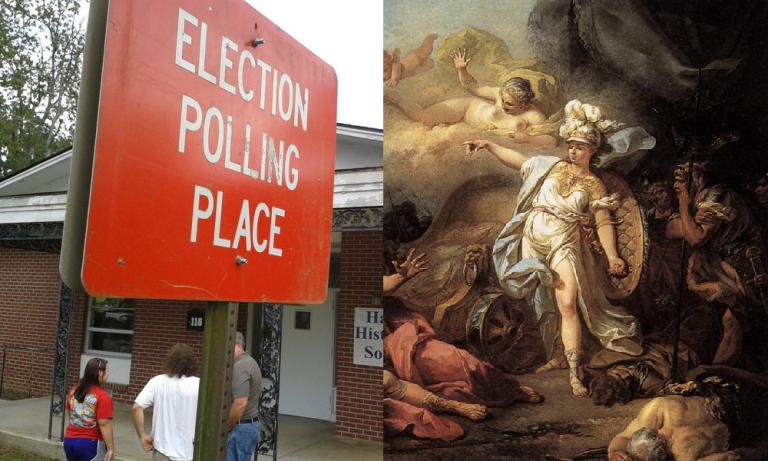Athena, the goddess of democracy’s triumph over plutocracy[Harrison, 300-301], has never been very popular in the United States.
Right from the start, our Founding Fathers were clear that they did not want a Athenian-style democracy, one where every citizen has a direct voice through an open assembly and officeholders are selected at random — where, as C.L.R. James put it in the title of his famous essay, “Every Cook Can Govern”.
This was not just a question of the practical difficulties of scaling democracy from city-state to nation-state. The Founders explicitly wanted a republic, a system without a king but where an elite privileged class, the “better” sort of men (women not yet having been discovered), would hold power and control the passions of the rabble.
Partly that’s because they were that aristocratic privileged class, and had no desire to relinquish their power as a group. But also it’s because of their historical ignorance. They did not understand how it was democracy that laid the foundations for Western civilization. As James wrote:
Now if the ancient Greeks had done little beside invent and practice this unique form of human equality in government, they would have done enough to be remembered. The astonishing thing is that they laid the intellectual foundation of Western Europe. Today when we speak about philosophy, logic, dialect; when we speak of politics, democracy, oligarchy, constitution, law; when we speak of oratory, rhetoric, ethics; when we speak of drama, of tragedy and comedy; when we speak of history; when we speak of sculpture and architecture; in all these things we use the terms and build on the foundations that were discovered and developed by the Greeks.
…
…It was in the days when every citizen could and did govern equally with any other citizen, when in other words, equality was carried to its extreme, that the city produced the most varied, comprehensive and brilliant body of geniuses that the world has ever known.[James]
In the example of Athens, we see that radical equality can lead to radical creativity. But instead, the Founders choose to emulate the Roman Republic — the system that degraded into Empire from its own flaws. Roslyn Fuller explains how Rome’s republic destroyed itself in her landmark book Beasts And Gods:
We now know what the Founding Fathers had not quite grasped: that by placing wealth and power in a mutually enhancing relationship, both became concentrated in ever fewer hands, excluding the vast majority of citizens and their interests from any share in the decision-making process. The increasing pressure on Rome’s elite to win elections at all costs set off a competition so fierce that it triggered decades of political assassination and civil war. Rome decayed from the inside and it decayed into an absolute dictatorship.[Fuller, 273]
Does this pattern sound more than a bit familiar?
How were the Founders — highly educated men — ignorant about this? This view of democracy and republicanism was widespread in their time, and largely it’s the fault of one of history’s most widely read assholes, Plato.

Socrates the Proto-fascist
It is through Plato’s writings that our ideas about his mentor Socrates have been formed, and the idea of the sophisticated and wise Socrates being sentenced to death by the ignorant mob for challenging convention is a classic criticism of democracy. (I even reference it in my song Even Wise Men Get The Blues.)
It also seems to be untrue.
Socrates was a foe of democracy, who believed that people were naturally unequal, that only the superior should be permitted to rule, that this class of “guardians” should censor and lie to get “inferior” people to accept rule by their betters, and that a eugenics program should be set up to breed “better” Athenians.
Despite these odious views, Athens tolerated Socrates’s bullshit; the people knew better than to try “deplatforming” him.[Fuller 330-334]
But several of Socrates’s students were among the Thirty Tyrants, a violent group of dictators who overthrew the democracy and murdered 5% of the Athenian population in less than a year. Critias, a leader of the Tyrants, was particularly close with Socrates; Plato wrote dialogues that were supposed to be between the two.
In keeping with Socrates’s ideas about rule by the best, the Tyrants drew up a list of 3,000 of the “best” men; anyone not on the list lost all rights and could be executed at any time.[Stone; Fuller, 333]
While Socrates did not directly take part in their depredations, he was not exiled with the democrats, nor did he flee with the moderates.[Stone] Other than refusing to participate in one execution, he seemed fairly comfortable with the situation. When democracy was restored, the people of Athens knew that Socrates’s ideas were a major influence on the Tyrants’ bloodshed. That, at root, was what the trial was about.[Fuller 336-338]
Plato’s account is a twisted attack on democracy by colleague of tyrants — and it shaped Europe’s idea of democracy for centuries.
Your Vote Is Supposed To Not Matter Much
And so the Founders’ view of democracy — the view of centuries of European imperialism — was shaped by Plato’s twisted account, and by the accounts of other wealthy men of Athens who resented democracy because it failed to give them political power. Literacy and writing was still the province of the well-off in Athens; the common people who were democracy’s staunchest defenders were less likely to leave behind any writings.
Similarly, views of Roman republicanism were shaped by writings surviving from Roman oligarchs, who found the corruption of politics by money quite to the their liking, not by the plebs.[Fuller, 272]
And of course, the Founders themselves were wealthy men with strong interest in preserving their power.
Though the Anti-Federalists managed to get a few compromises (like the Bill of Rights) toward democracy into the Constitution, by and large the whole point of the American system of government form the start has been to keep the levers of power out of the hands of the people.
And it’s succeeded.
A study published in Perspectives on Politics in 2014 looked at 1,779 cases where citizens were polled about what policy outcomes they wanted, and compared the people’s desires with the actual political outcomes. The authors found that “economic elites and organized groups representing business interests have substantial independent impacts on U.S. government policy, while average citizens and mass-based interest groups have little or no independent influence.”[Gilens]
It is ironic and problematic that this style of republic, structured from the start to restrict democracy and preserve the power of the wealthy, has become synonymous with “democracy” in modern conversation.
In general, your vote matters little. That’s how the system was designed from the start. As George Carlin put it, “It’s a big club and you ain’t in it.”
Vote To Keep In Practice
Still, that’s a general conclusion. You may have an exception on your ballot.
If you have a have a clear choice between good and bad candidates, and the outcome has not already been predetermined by restrictive ballot-access laws, gerrymandering, voter purge shenanigans, or the like, cast your vote feeling that it matters.
But what about the rest of us? What if your vote doesn’t matter? Why bother to go to the polls?
If democracies are better than republics, and if the United States is a republic and not a democracy, than we ought to do what we can to push the nation to grow in a more democratic direction. Athens didn’t start as a democracy, after all; the had experimented with representative government and found its failures before building their democracy.
(For a preliminary look at what direct democracy might look like in the modern world on the scale of technological-industrial nation-states rather than agricultural city-states, I recommend Fuller’s book.)
But in the meanwhile, it is a worthwhile principle of healing that the sick or injured patient should exercise whatever capacities they do have in order to prevent atrophy. If participating in a true democracy is a healthy person living an active life, then voting in our ailing republic is a patient in the ICU struggling to move their fingers and toes.
But we won’t get better if we don’t exercise the tiny capacity we do have. So go vote!
You can keep up with “The Zen Pagan” by subscribing via RSS or e-mail.
References
Fuller, Roslyn. Beasts and gods : how democracy changed its meaning and lost its purpose. London: Zed Books, 2015.
Gilens, Martin, and Benjamin I. Page. “Testing Theories of American Politics: Elites, Interest Groups, and Average Citizens.” Perspectives on Politics. Vol 12 No 3, 2014, pp. 564–581. doi:10.1017/S1537592714001595 <https://www.cambridge.org/core/journals/perspectives-on-politics/article/testing-theories-of-american-politics-elites-interest-groups-and-average-citizens/62327F513959D0A304D4893B382B992B/core-reader#>
Harrison, Jane Ellen. Prolegomena to the study of Greek religion. 2nd ed. Cambridge University Press, 1908. <https://archive.org/details/prolegomenatostu00harr/>
James, C.L.R. “Every Cook Can Govern.” Correspondence Vol. 2, No. 12. June 1956. <https://www.marxists.org/archive/james-clr/works/1956/06/every-cook.htm>
Stone, I.F. “I.F. Stone Breaks The Socrates Story.” New York Times 8 Apr 1979: SM6. <https://www.nytimes.com/1979/04/08/archives/if-stone-breaks-the-socrates-story-an-old-muckraker-sheds-fresh.html>














